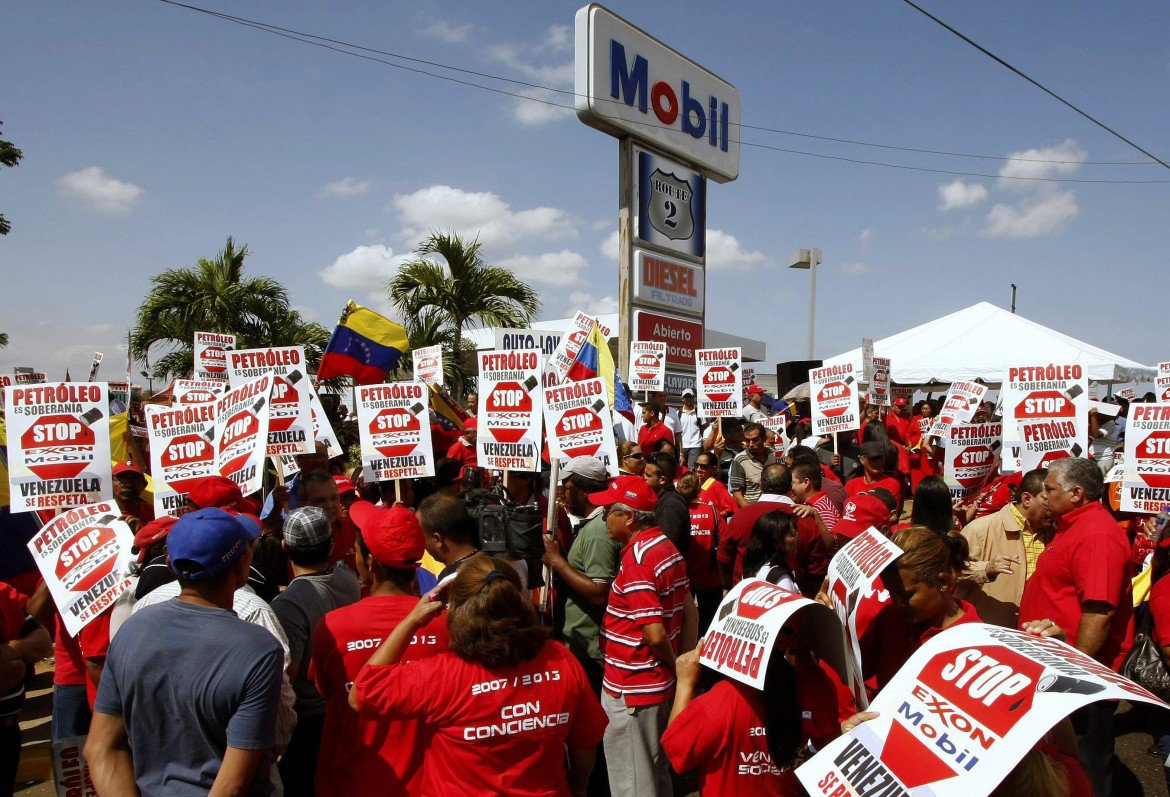Commentary
ExxonMobil: A story of power and disaster
The U.S. multinational’s conquest of Latin America involves strong-arming elected governments.

ExxonMobil is the largest U.S. oil company and one of the most expansive multinationals, selling around $250 billion a year and operating in Europe under the brand name Esso. It is directly or indirectly active throughout Latin America, mainly in Argentina, Brazil, Colombia and Mexico.
It focuses on exploration, production, transportation, refining, distribution and trading of crude oil, gas and its derivatives. In addition, it participates in the electricity market and the manufacturing of chemicals, plastics and fertilizers. In Argentina, the Texas-based company does big business with shale oil in the mining area of Vaca Muerta.
Its scope is now expanding under the policies of the neoliberal President Mauricio Macri (a longtime friend of Donald Trump), who’s taking steps to further open the door to large mining companies and close it to workers.
Republican Sen. John McCain — not exactly a cherub — called the company’s CEO, Rex Tillerson, nominated as Trump’s Secretary of State, “a criminal, a bully and a murderer,” especially for his historic friendship with Igor Sechin, the most powerful man in Russia after Putin. Environmentalists and Latin American leftists have many more noble reasons to fear the growing power of the multinational and its deadly ambitions on the continent.
Last year, ExxonMobil was even awarded the Green Cross Medal for safety, which is given to companies that comply with the highest safety standards for its employees. The capital investments for such a firm are gigantic, and some is invested in its image. In just the first quarter of this year, the company invested $18.2 billion.
All the money in the world is not enough to heal the wounds inflicted on nature after a giant oil spill like the one in the Prince William Sound in Alaska in 1989, when an Exxon oil tanker struck a reef. The business of ExxonMobil, which wants to take advantage of the state oil company’s debt, Petrobras, now has free rein in Brazil, where the Temer government is proceeding at full speed to privatize public enterprises. ExxonMobil is one of the largest companies in Colombia; it was between the 15 largest companies of the country in terms of sales.
When the governments are not compliant, Exxon Mobil goes to war with them, even relying on U.S.-based arbitration courts. As CEO, Tillerson clashed with former Venezuelan President Hugo Chavez, who decided to expropriate a dozen foreign oil companies, after proposing some “compensation.” Exxon did not accept it and began a legal battle, which is ongoing. At one point, it successfully froze the assets abroad of the Venezuelan state oil firm, PDVSA.
Venezuela, after Argentina (when it was ruled by Cristina Kirchner), is the second country in the world with more open cases in arbitration courts for expropriation and nationalization settled between 2007 and 2012: in total, 38.
During the Chavez administration (1999-2013), multinationals filed 37 applications at the ICSID, the World Bank entity created in 1996 to settle disputes related to foreign investment. During the Fourth Republic, the Venezuelan state had been taken to the ICSID only once: by FEDAX in 1996.
The largest number of trials against the Bolivarian government (55.3 percent) have been brought by multinational oil companies, among them ExxonMobil. The U.S. company has not accepted Venezuelan law that, in addition to enforcing respect for workers and the environment, limits oil extraction activities to a system of joint ventures in which PDVSA is the majority.
Since Nicolas Maduro’s election following Chavez’s death, the Guyana Esequibo case has exploded with ExxonMobil in the middle of it. With the victory of the right in Guyana, ExxonMobil has agreed to start exploration in the Esequibo territory, a 160,000-square-kilometer area rich in natural resources and especially oil, bordering Guyana.
This territory is under dispute with Venezuela, which has claimed sovereignty since 1897. Currently, the dispute is entrusted to the Secretary-General of the United Nations, as determined by the Geneva Agreement.
Originally published at http://ilmanifesto.info/disastri-e-potere-della-exxon-mobil/ on 2016-12-15
